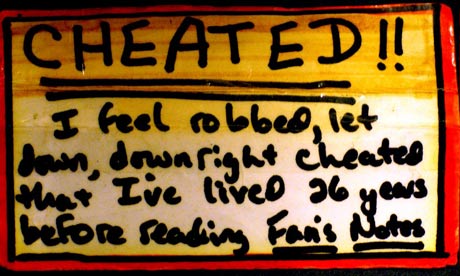
You have almost certainly seen a shelf-talker, even if you didn't know it was called that: one of those little cards attached to the shelf on which a bookshop – or, better, an individual bookseller – pours out their enthusiasm for the title above.
Shelf-talking at its best is represented by the examples posted a month or so back on the blog of the Green Apple bookshop in San Francisco, one of which we've reproduced (with permission) above: full of the joy of reading, and of exuberantly expressed personality, with added visual flair. (The children's examples in their second instalment are even cuter.) The Moby Lives blog, which alerted me to the Green Apple post, says that in the US shelf-talkers are an indie-bookshop thing. I don't get the impression that's so over here – the most concerted attempts to use the technique I remember have been at Waterstone's and, particularly, the once-American Borders.
This doesn't exclude individuality – my all-time favourite shelf-talker was at the Islington Borders – but it does mean that it's likely to come with added corporate branding. For every handwritten note, there is a glossily printed one giving the opinions of a bookseller hundreds of miles away, filtered through the marketing department. I have never been sure why a shopper at a bookshop in Glasgow is meant to be swayed by the opinion of a bookseller in Llantrisant. Shelf-talkers work, for me, on a sense of connection with the people who created the nice space I'm currently in – the rest of the shop serves as a character reference.
So what about you, reader? Have you been seduced by a cry of ecstasy from some distant branch, or drawn in by the intense handwriting of a bookseller you think you might know by sight? Do shelf-talkers speak to you?

